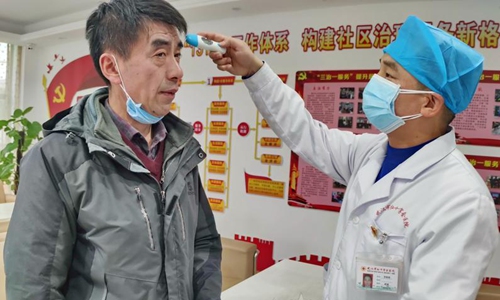HOME >> SOURCE
Chinese firms urged to accelerate genome sequencing self-development amid novel coronavirus
By Ma Jingjing Source:Global Times Published: 2020/1/22 19:08:40

A doctor measures a man's body temperature in Wuhan, Central China's Hubei Province, during community activities to help prevent and control the new pneumonia. Photo: China News Service
China's rapid release of the genome sequence of the novel coronavirus that originated in Wuhan, Central China's Hubei Province, shows the country's progress in genome sequencing research, but experts on Wednesday urged fast independent research and development of the industry to master core technologies.
First detected in Wuhan in late December 2019, the World Health Organization announced on January 12 that it had received the RNA sequence of the virus from China. This is extremely rapid compared with the four months it took during the outbreak of Severe Acute Respiratory Syndrome (SARS) in 2003.
RNA is a molecule essential in biological roles including coding, regulation and expression of genes.
Within 10 days of the announcement, the National Health Commission said Sunday that a procedure, known as a virus detection assay, for a rapid test of suspected cases has been developed. Domestic biotech firms such as Jiangsu Bioperfectus Technologies and Shenzhen-based genome sequencing company BGI Group said they had finished developing relevant products.
BGI told the Global Times Wednesday that the company started research and development (R&D) for the product at the beginning of January and completed it on January 14.
However, experts said that while manufacturing the assay in two weeks is fast, more important is the capability to detect the sequence of the virus, or genome sequencing technology.
The development of domestic genome sequencing industry still has a gap with the US, with the upstream equipment imported and core technologies mastered by a handful of foreign companies, Li Tianquan, co-founder of domestic healthcare big data platform yaozh.com, told the Global Times on Wednesday.
According to an estimate of US financial services firm Morningstar in June 2019, San Diego-based genome sequencing giant Illumina accounts for over 70 percent of the global sequencing market, while with its dominance of the high-throughput segment, it generates over 90 percent of the world's sequencing data.
"To develop genome sequencing platforms independently requires an overall improvement in basic disciplines. It needs huge capital investment and a large number of skilled professionals, and therefore can't be achieved within several years," Li said.
In 2015, China's first bio-safety level four laboratory was established in Wuhan, meaning that the country has hardware for diagnostic work and research on easily transmitted pathogens which can cause fatal diseases, including the Ebola virus.
Posted in: INDUSTRIES,COMPANIES